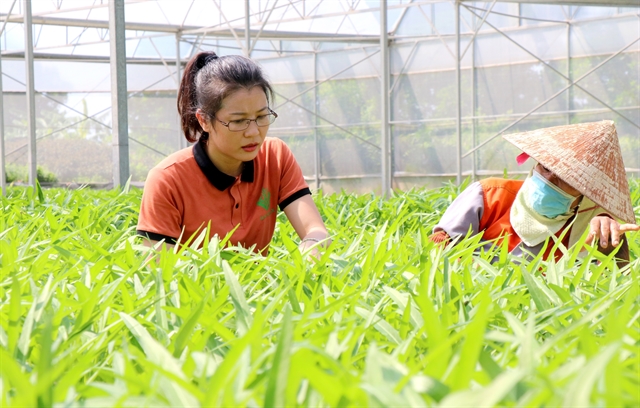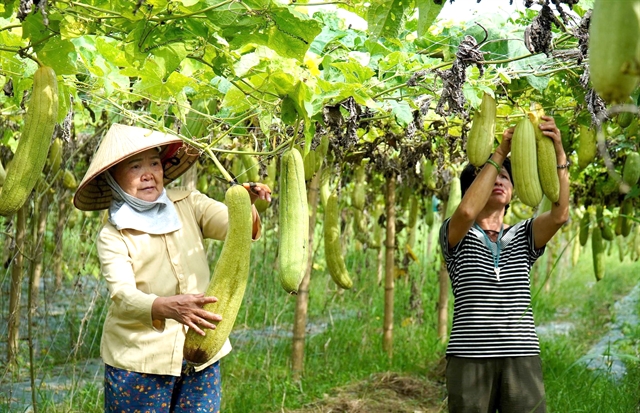 Society
Society

 |
| Nguyễn Thị Trâm (left) takes care of her farm in Minh Tân Commune, Lương Tài District, Bắc Ninh Province. — VNA/VNS Photo Đinh Văn Nhiều |
BẮC NINH — Bắc Ninh has established itself as a province that encourages rapid industrial development and leads the way in high-tech agriculture development.
The province has seen a wave of organic agriculture, which has increased people's income and encouraged sustainable agricultural development, the Tin Tức (News) newspaper reported.
The Liên Ấp Cooperative is a shining example of a successful organic vegetable and fruit producer in the Việt Đoàn Commune, Tiên Du District.
In 2011, while several households in the area were cultivating vegetables as per Vietnamese Good Agricultural Practices (VietGAP) standards, Nguyễn Văn Hiệp took the initiative to bring together some local farmers and establish the Liên Ấp Village organic vegetable group.
Hiệp is the leader and directly manages operations, from buying seeds, setting up planting schedules, choosing techniques, harvesting and checking vegetables before selling.
Each year, the group produces hundreds of tonnes of vegetables.
From the initial success, in 2018 Hiệp called for group members to contribute land and capital and complete procedures to found the Liên Ấp Cooperative. He is the director.
This effective model opened a new direction in agricultural production in Bắc Ninh Province.
As well as producing agricultural products, the cooperative supports its members in animal husbandry.
It attracted nearly 150 households to participate, producing on an area of more than 140ha, of which vegetables are nearly 40ha and rice over 100ha.
It has a turnover of VNĐ6-7 billion (US$257,500-300,400) per year.
The Liên Ấp Cooperative has created jobs for more than 300 workers in the village with an income of VNĐ4-5 million ($170-214) per person per month.
As well as a successful agricultural production and consumption cooperative, it is also one of the leading cooperatives in new environmentally friendly rice variety in Bắc Ninh Province.
Hiệp said that in 2021, the Bắc Ninh Farmers' Association deployed a system of rice intensification (SRI).
With some basic technical measures, such as spreading thinly, alternating wet and dry irrigation, using organic fertilisers and treating straw with post-harvest microbial products, this method has shown remarkable results compared to the traditional rice transplanting method.
“Before implementing the model, most people thought that pesticides and fertilisers were the optimal methods to increase rice yield," said Hiệp. "But, with more than 1ha of SRI trial planting, people reduced costs and increased rice productivity, proving the model’s effectiveness."
Now, all households in the cooperative apply SRI with nearly 200ha.
Another good example is Nguyễn Thị Trâm’s farm in Minh Tân Commune, Lương Tài District.
From a small farm in 2014, Trâm transformed from a farm economic model to the Hải Phong Agricultural Import-Export Co Ltd, which specialises in agricultural products on an area of 5ha.
Realising the importance of organic food, she produces vegetables and fruits according to VietGAP standards.
Thanks to that, the company's products easily dominate the market in big supermarkets such as Vinmart and Big C.
So far, the company has expanded to more than 10ha, specialising in growing vegetables of high economic value in Bắc Ninh and Hà Giang provinces, creating dozens of workers.
The company uses machines in production and sprinkler irrigation systems.
Thanks to the hi-tech agricultural system, the company has four products participating in the One Commune One Product (OCOP) programme of Bắc Ninh Province.
Its most prominent product is baby cucumbers.
Sustainable development
 |
| Farmers work in a vegetable farm in Nguyệt Đức Commune, Thuận Thành District in Bắc Ninh Province. — VNA/VNS Photo Đinh Văn Nhiều |
The Bắc Ninh Department of Agriculture and Rural Development (DARD) said that the province had 72 high-tech cultivation establishments with a total area of 160ha.
Twenty-nine of them reached VietGAP standards with more than 154ha.
Nguyễn Công Trình, deputy director of the provincial DARD, said that high-tech agriculture was an inevitable direction.
He said that high-tech agriculture development was necessary for a province with a narrow natural land area and high population density but with the advantage of geographical location like Bắc Ninh.
The 20th Provincial Party Committee’s Resolution determined the agricultural sector’s direction in general and cultivation in particular.
The resolution states that the province will create a strong change in agricultural and rural development, focusing on promoting high-tech agriculture in association with the new rural living style.
To achieve the above goal, the agricultural sector flexibly and synchronously applies smart solutions to meet market requirements.
Trình said that to protect the environment in sustainable agriculture without being severely affected by chemicals, it was necessary to find solutions for all stages of the production process.
Over the years, Bắc Ninh has guided farmers to use permitted pesticides and properly collected pesticide packaging after use.
It raises farmers’ awareness and responsibility towards sustainable ecological agriculture, minimising environmental pollution.
The province instructs local people to deploy and replicate the VietGAP model and apply organic technology to production.
To promote and develop a clean, high-tech agriculture model, Bắc Ninh has issued many policies.
The policies create favourable conditions for people to access preferential credit sources with low-interest rates.
It supports farmers in trade promotion and brand promotion of OCOP products, and Bắc Ninh will promote high-technology research and application in agriculture.
It will increase product value, focusing on planning high-tech and large-scale agricultural production areas.
The plan will suit each region's natural conditions and advantages.
The province encourages the foundation of cooperative groups through capital contribution, creating concentrated commodity areas large enough to serve export demand. — VNS




